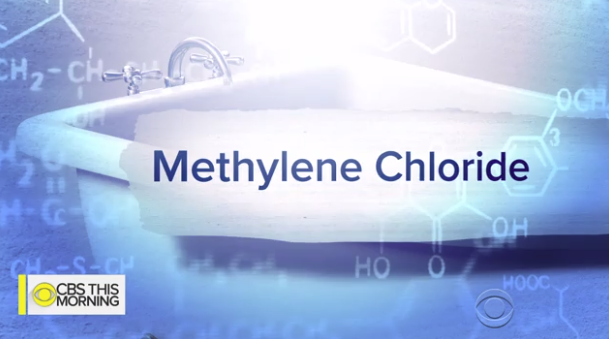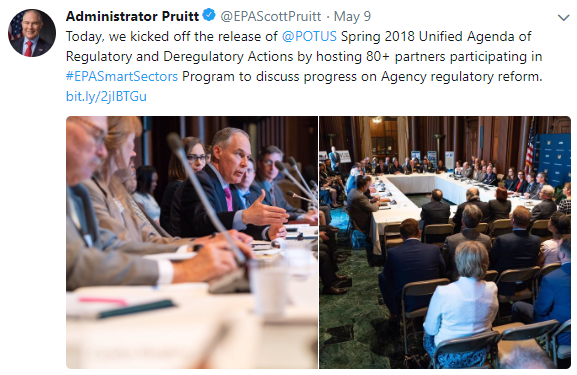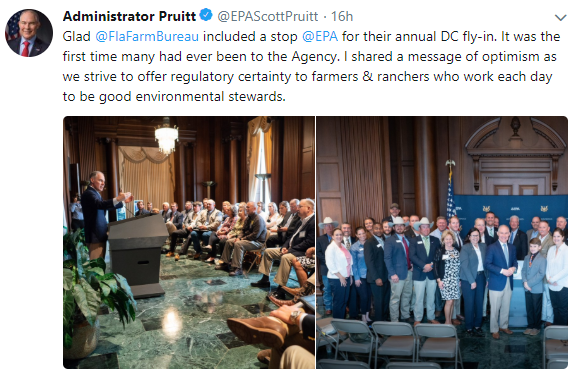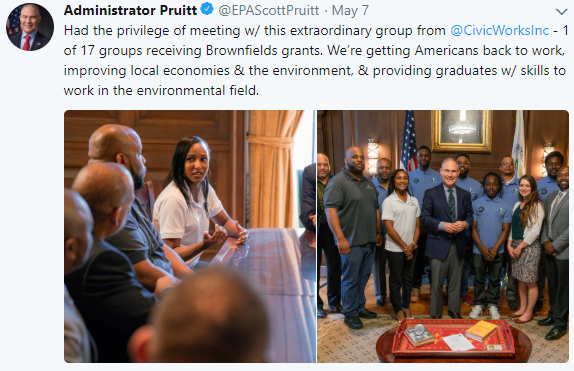News Releases from Headquarters›Office of the Administrator (AO)
EPA's Weekly Report
This week, U.S. Environmental Protection Agency (EPA) Administrator Scott Pruitt hosted over 80 partners participating in the Smart Sectors program to kick off the release of the President's Spring 2018 Unified Agenda of Regulatory and Deregulatory Actions, awarded $3.3 in grants to 17 organizations across the country for environmental job training and workforce development programs, and took major strides to improve Massachusetts' and New Hampshire's water quality. But that's not all...
EPA'S WEEKLY REPORT
This week, U.S. Environmental Protection Agency (EPA) Administrator Scott Pruitt hosted over 80 partners participating in the Smart Sectors program to kick off the release of the President's Spring 2018 Unified Agenda of Regulatory and Deregulatory Actions, awarded $3.3 in grants to 17 organizations across the country for environmental job training and workforce development programs, and took major strides to improve Massachusetts' and New Hampshire's water quality. But that's not all...
THIS WEEK AT EPA...
EPA Administrator Pruitt announced action on methylene chloride and the Agency's commitment to finalizing the rulemaking. The Agency is not re-evaluating the paint stripping uses of methylene chloride, but relying on its previous risk assessments and working diligently to ensure the safety of chemicals in the marketplace.
Additionally, CBS This Morning reported EPA’s actions

The Washington Post reported, Mothers lobbied EPA Administrator Pruitt to ban a toxic chemical and two days later EPA signaled it would.
On Wednesday, Administrator Pruitt's signed a memorandum to reform the process for setting national air quality standards in a manner consistent with cooperative federalism and the rule of law. Here's what people are saying:
- U.S. Chamber of Commerce's Dan Byers: "EPA’s National Ambient Air Quality Standards (NAAQS) process has long been in need of improvement, so we’re pleased to see EPA take action to do just that. Today’s announcement signals a new approach focused on key statutory duties and regulatory flexibility, which should lead to a better process that won’t impede economic growth."
- National Association of Manufacturer's Ross Eisenberg: "Manufacturers applaud EPA for recognizing the problems that have plagued past air quality determinations and for taking strong steps to correct them. We hope today's announcement leads to better, more effective regulations and improved air quality."
- Pennsylvania Chamber of Business and Industry's Gene Barr: "We are pleased to see EPA institute common-sense reforms to the National Ambient Air Quality Standards process that will provide regulatory flexibility and that will allow the country to continue the significant, documented progress in improving air quality while the economy expands... We applaud the administration and EPA for their leadership on this issue."
- American Petroleum Institute's Howard J. Feldman: “We look forward to continuing this progress in achieving our shared goals of protecting public health and the environment and meeting the nation’s energy needs. The steps identified in the administration’s recent memorandum should provide certainty and relief to states and businesses by streamlining the air quality standards process, hopefully reducing the impact on U.S. manufacturing and business expansion while maintaining the protections of public health.”
- Senate Environment and Public Works Chairman Sen. John Barrasso (R-WY) “I applaud the Trump administration’s efforts to improve implementation of the Clean Air Act. These necessary reforms will give certainty to states and businesses. The reforms will also make sure the Environmental Protection Agency considers all relevant data and information when it makes decisions. That is just good government.”
- Former EPA Assistant Administrator for the Office of Air and Radiation (2001 – 2005) Jeff Holmstead: “These reforms are long overdue. Congress clearly understood that there would be tradeoffs involved in the Clean Air Act. It’s good to see that the public will finally get an authoritative accounting of the adverse effects caused by some of EPA’s regulatory mandates. Policymakers, including members of Congress, need to understand the adverse public health, social, and economic effects of the actions that will be needed to meet inflexible air quality standards.”
- Former Chairman of EPA’s Clean Air Scientific Advisory Committee (1992 – 1996) Dr. George Wolff: “A consequence of EPA’s non-transparent National Ambient Air Quality Standards (NAAQS) setting process (which the Administrator rectified last month), has been the establishment of some standards near background levels. The policy ramifications of this have not been fully appreciated. Setting the NAAQS at such low levels has also exacerbated unintended adverse impacts. The contributions to uncontrollable background levels and the nature of these adverse effects need to be better understood to inform policy making decisions. It is not only appropriate that CASAC be an integral part of these discussions, but it is also mandated by an often-overlooked section of the Clean Air Act.”
While hearing from partners in EPA's Smart Sectors program, the Agency released the Spring 2018 Regulatory Agenda, which included a total of 59 deregulatory actions - 11 of which are new. The agenda outlined 38 actions appearing for the first time and another 24 actions that were completed since the publication of the Fall 2017 Semiannual Regulatory Agenda.
- Portland Cement Association's Mike Ireland: “The Smart Sectors program has been a game changer for our dialogue with EPA on pragmatic and effective environmental protections.”
- Steel Manufacturers Association's Philip K. Bell: “The Smart Sectors program has allowed the SMA and the US EPA to work together in a manner that supports our member company needs and the administration’s agenda... Administrator Pruitt and this Administration have worked tirelessly in their pursuit to remove regulatory blocks that impact the operations of industrial facilities.”
- The Real Estate Roundtable's Jeffrey DeBoer: “Environmental protection and job creation are all mutually compatible priorities for the US real estate sector. Working with EPA and our other sector partners, the real estate industry looks forward to optimizing our shared energy efficiency and economic goals – particularly the growth and expansion of the ENERGY STAR for Tenants initiative, which is precisely the kind of voluntary, market-driven program that effectively partners the private and public sectors."
AND AROUND THE COUNTRY ...
The Agency selected 17 organizations to receive a total of $3.3 million in grants for environmental job training programs across the country and Administrator Pruitt met with current students and graduates from Baltimore-based grantee Civic Works, Inc.. Other grantees include Anchorage- based Alaska Forum, Inc., the Los Angeles Conservation Corps, Sustainable South Bronx, and multiple cities - City of Springfield, MO, City of Pittsburg, CA, City of Tacoma, WA. Since the EPA's Environmental Workforce Development and Job Training Program begin in 1998, more than 288 grants have been awarded, over 17,100 individuals have completed training, and of those, more than 12,500 individuals have been placed in full-time employment earning an average starting wage of over $14 an hour.
EPA appointed 14 new members to the Local Government Advisory Committee and 10 new members to the Small Communities Advisory Subcommittee further advancing the Agency's commitment to cooperative federalism. New members span from California to Puerto Rico and New Hampshire to North Dakota and their proven leadership and record of service to their communities will be an invaluable asset in advising Administrator Pruitt.
EPA announced a major step forward for both Massachusetts' and New Hampshire's water quality with improved stormwater management requirements in addition to new training and implementation tolls to assist municipalities. These new permits will better protect rivers, streams, ponds, lakes, and wetland from harmful pollutants in the states' urbanized areas and maximize flexibility for individual municipalities to tailor stormwater management efforts to their individual needs and local conditions.
TWEETS ...



